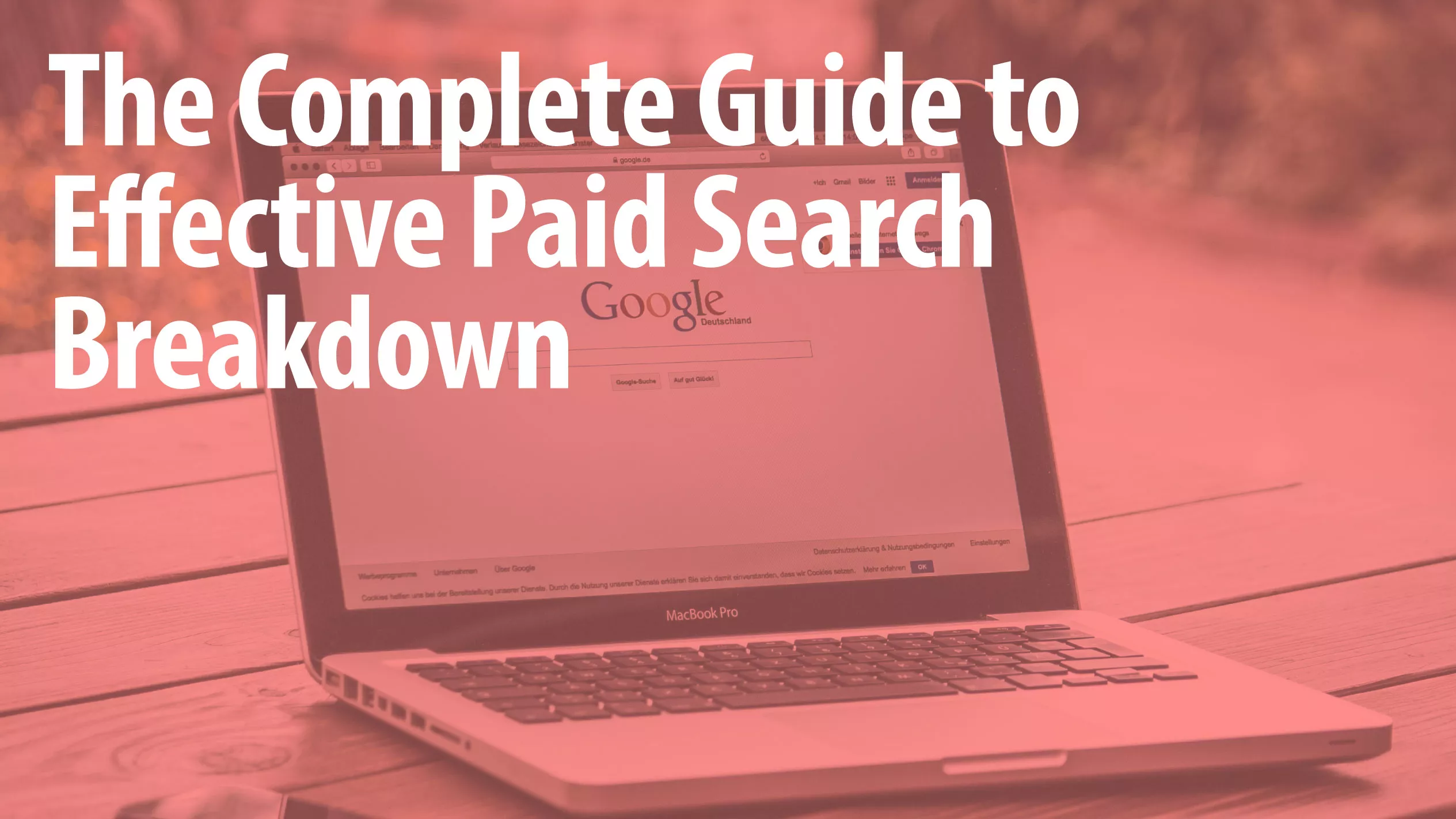
TABLE OF CONTENTS
Like all business ventures, advertising has changed dramatically with the growth of online paid search. Now, it’s also much more complex. Back in the day, you could pay for advertising space in a popular magazine and watch your sales grow almost immediately. It’s safe to say we’ve come a long way since then. Today, online advertising provides a ton of options from PPC advertising, paid social media marketing, and much more. These tools help your business to be more visible on search engines as well as social networking sites.
Because of the transition to online advertising, businesses of all sizes must come around to the idea of digital channels to market their products and services. Among small business owners, email marketing is the second most used marketing channel of all available mediums. With a heavy reliance on these digital channels, optimization and tracking results are integral to achieve the best results. After all, you’re tracking the effectiveness of your online efforts.
Of all the different types of digital channels a business owner can choose from, paid search is the most important. Paid search marketing also happens to be the medium that many business owners know the least. We will break down this topic below.
What is Paid Search Marketing?
First, le’s define what paid search marketing is. Paid search is a type of search engine marketing that identifies web browsers that are searching for products and services that match your eCommerce business’s ads. Advertisements that you pay for show up on internet search engines and platforms. This type of marketing is known as Pay-per-click or “PPC” marketing.
PPC works by paying the network that shows your ad each time your ad gets a click. This allows you to increase website traffic in addition to the visits it gains from organic searches. The most well-known platform that marketers are familiar with is Google. Though there are other platforms available including Bing, Adroll, Facebook, and Yahoo Gemini.
The digital marketing channels that make up the marketing and engagement activities available through online media include:
- Business websites
- Search Engine Marketing (SEM)
- Search Engine Optimization (SEO)
- Pay per click advertising (PPC)
- Remarketing
- Marketing automation
- Email marketing
- Messenger marketing
- Social media marketing
- Video marketing
PPC Advertising Terms
There are a lot of terms that are commonly used in the PPC advertising world. Here are the basics you should be familiar with:
- Ad position: The location of where your ad appears in search results.
- Click: This is the action a user takes when they click their cursor on an ad.
- Click-through-rate (CTR): Expressed as a percentage, the number of times an ad has been clicked divided by the number of times the ad has appeared.
Conversion: The name given for when a customer completes a certain action, i.e. downloading an eBook or submitting a web form.
- Cost-per-click: What an advertiser pays a search engine for a click on their ad.
- Default max CPC: During an auction, this is the maximum an advertiser is willing to pay for a click.
- Average CPC: Average amount that’s spent for each click.
- Impressions: The number of times an ad appears on a page.
- Keyword: A phrase or word that’s displayed on an ad.
- Landing page: An ad will take a user to this webpage when they click.
- Optimize: Improvement that can be made on an account, i.e. changing the targeting of an ad, using keywords.
- Search Engine Results Page (SERP): When typing in a search query, these are the results that are displayed.
- Targeting: Options that are available to optimize an ad campaign, i.e. device, location, day and time, and demographics.
The more familiar you are with these terms the easier it will be for you to understand the complexities of your PPC campaigns. If you decide to handle online advertising for your business by yourself, these will be essential for you to know. If not, a PPC manager will be familiar with all of these terms and more to help get your online presence to where it needs to be.
How Paid Search Works
A real-time auction occurs for keywords when there is an available ad spot on a search engine results page (SERP). Various factors including the amount of bid, ad quality, the landing page (which the ad will take the user to) determine the business that will appear in the top ad spot on the SERP.
Auctions are the moving pieces of PPC and occur when a user searches on a search engine for something. Businesses that are interested in showing their ad based on the search query made by the user compete in an auction that’s triggered by the keyword. The auction winner ads will then appear on the results page of the search engine platform.
Businesses can participate in these auctions by setting up an account on the chosen platform. For example, a Google Ads account would be necessary for a business to get involved in the Google search engine auctions.
The following formula can be used to calculate the ad ranking in search results: Ad Rank = Bid x Quality Score.
Top Three Factors that Determine Quality Score
So you may be wondering, “What determines my business’ quality score?” Well, Google doesn’t share the actual formula that they use to determine the quality score. Here’s what can be gleaned from the guidelines provided by Google:
- Ad Relevance: What is the relevance of your ad in relation to what the user is looking for?
- Expected Click-Through Rate (CTR): What is the likelihood of your ad being clicked? Google will estimate this by looking at your previous ad performance, the previous performance by your competitors, and features you’re using on Google Ads.
- Landing Page Experience: What is the relevance of your landing page that the ad sends a user to in relation to the user’s initial search? What is the ease of use for people who land on your page? This is determined by factors including the load time and how mobile-friendly the landing page is.
How to Build a Relevant Landing Page
The landing page that a user will be directed to from an ad is not just important because it is a factor in Google’s quality score. A poorly designed landing page will confuse or frustrate a web browser if it is not easy for them to navigate and find what they are looking for. It is challenging for that click to result in conversion when this occurs. That’s why it’s important to optimize your page to improve your website’s organic click-through rate.
The ad’s job is to pique the potential buyer’s interest so that they click through to your landing page. The messaging found on the landing page will do the heavy lifting. A great landing page will have the following:
- Bold headline: Located at the top of the page, this should immediately catch the user’s attention.
- Lead capture form: Contact information of this potential buyer so they can be contacted further through email marketing, sales call, etc..
- Call-to-action: This should be clear and easy to locate on a landing page (i.e. a “Purchase” or “Buy it Now” call to action would take a user to a shopping cart).
- Benefits of product/service: The unique benefits provided by the product or service should be explained from the user’s perspective and be written concisely.
Paid Search vs Organic

If you have ever done a Google search, you have seen paid search ads in your results. Paid search ads appear at the top of search engine results when certain keywords are searched. There is a small symbol that says “ad” which indicates that it is a PPC ad. It appears on the first page of search engine results and web browsers may not realize that it is an ad when they initially click on it. This is important considering 92 percent of traffic from a normal search is generated from the first page of search results.
After these paid search ads are the organic search listings. These organic results are ranked by the quality and content of the page. Moving up these rankings is challenging and requires time for a website to be indexed. Google has made it more difficult for webmasters by cracking down on methods such as “Black Hat” SEO and keyword stuffing. Increasing organic traffic is worth the effort in the long run. Much like paid search optimizing, organic optimization will help your intended landing pages rank better but without the monetary investment.
With the increased competition with organic traffic, PPC advertising has increased in popularity. Nowadays it typically takes between three to six months to move within search rankings. For most businesses, they can’t wait that amount of time when they want web visitors to convert to sales.
The Top 4 Benefits of Paid Search
Paid search marketing is a popular channel for many businesses in today’s digital environment. Here are the top four benefits that paid search offers:
1. Cost-Effective
On average, a business earns $2 in income for each dollar spent on Google Ads. The amount your campaign is spending on paid search is up to you or your ad manager. Additionally, you can measure the results at any time. For example, if you spent $500 on a magazine ad for your bail bonds business, you are getting many eyes on it that aren’t seeking your services. On the other hand, $500 spent on PPC advertising will get you leads that are more likely to be looking for the best tactics.
2. Increased Visibility
Building your online presence through SEO, increasing your website’s reputation, etc. is going to take time. Paid search gets you results without having to wait. Your ad gets in front of more qualified prospects on the first search results page immediately.
3. Increased Traffic
Fortunately, a page’s traffic will likely increase eventually when it’s optimized for organic search results. This happens over several months of effort whereas you can get more traffic immediately with paid search ads. However, newer companies specifically can benefit from using PPC advertising to get their name out there. No more having to wait for an established audience to stat bringing in customers.
4. Targeted Prospects
With paid search, you are selecting the keywords that initiate your ad (or exclude keywords too), target certain locations, and more. You’re getting more qualified prospects that have indicated they have an interest in your product or service.




 Conversion: The name given for when a customer completes a certain action, i.e. downloading an eBook or submitting a web form.
Conversion: The name given for when a customer completes a certain action, i.e. downloading an eBook or submitting a web form.
